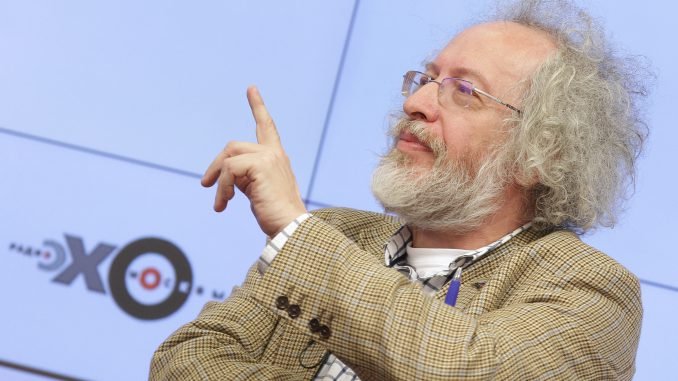
(Starting on 11 January, this article and others like it will only be available to Individual and Corporate subscribers)
“Today, I see no signs that Russia, after Ukraine, after the near east, would open a third front in the Baltic region. If some unfortunate event were to occur, it would be important to demonstrate cool blood and to maintain a level head, to resist provocation,” the journalist said.
As far as Russia’s concerns with the Baltics, Venediktov emphasized three key points. “The first aspect is imperial, which is an important idea, a mental aspect. They were once with us, and now they are not. As far as I know our president, however, he does not consider the Baltic nations to be traitors like he does Ukraine. In his eyes, Ukraine and Georgia are traitors.”
“He understands that you were always somewhat on the fringe,” Venediktov told Delfi, a Baltic media company. “According to this imperial aspect, however, the existence of local Russian-speaking residents is very important. Based on the ‘Russian world‘ concept that Vladimir Putin propagates, they are his subjects or potential subjects – or people who need the so-called protection and care of their titular nation.”
“This aspect is important for the Baltic states. Their history is, on the one hand, related to the imperial past, but on the other, they are not part of Russia. From Vladimir Putin’s territorial perspective, they are not part of Russia, unlike other territories. Regardless, the existence of Russian minorities that listen to Putin’s orders and, according to certain parameters, feel discriminated against put him in a comfortable role, as their defender and savior. That happened in Donbas.”
The second point, according to Venediktov, is that “the Baltic states and Poland are considered to be the front of an active Western anti-Russian coalition. They are territories used to deploy weapons, to deploy rockets closer to Moscow, to moor warships. This entire territory and the aforementioned countries, regardless of what happens, are and will be considered hostile. They are a countermeasure.”
“The third aspect is that these nations are members of NATO. In other words, they are viewed as platforms for the spread of Russian speakers’ traditions, but also as territories and governments that have assumed more anti-Russian positions (regardless of who, here in the Baltics, becomes president or prime minister) than Angela Merkel, David Cameron or Francois Hollande. So the third aspect is NATO, which is considered to be the greatest enemy.”
“These are the challenges that Russia’s government must consider in their relationship with the Baltic states. The Baltic states are no longer considered independent players – they are a part of this hostile background, in which Russian-speaking people live as well. They are territories where weapons are deployed and ships are moored.”
As we reported earlier, Venediktov has personally met and spoken to Putin, both before and after he became president. “Despite everything, many people who make decisions, who know Vladimir Putin and work closely with him every day, say that the president is careful, he has a feeling for when he shouldn’t cross the line. They see better from his side.”
“I always considered him a wise person,” said Venediktov. “I wouldn’t say careful, which is why I emphasize that I don’t understand him anymore. It seems to me like some of his decisions and steps are not quite so well thought-out, and their consequences are not quite as long-term as we might wish. This is why I’d like to speak to him and figure out or understand whether something has changed, or whether I’ve misunderstood something.”

Be the first to comment